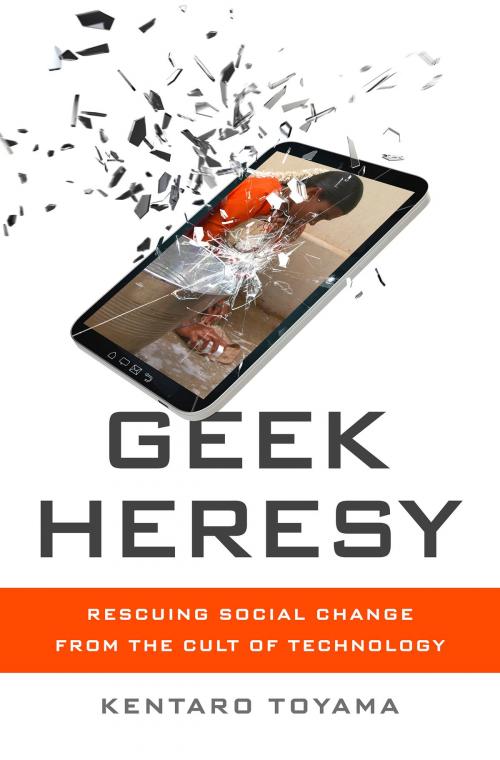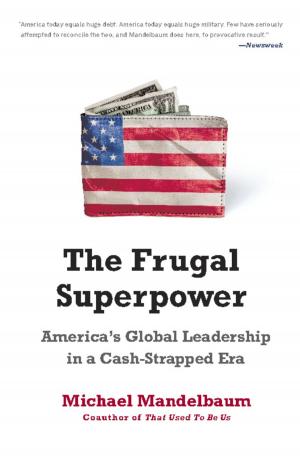Geek Heresy
Rescuing Social Change from the Cult of Technology
Nonfiction, Science & Nature, Technology, Social Aspects, Business & Finance, Economics, Economic Development, Computers| Author: | Kentaro Toyama | ISBN: | 9781610395298 |
| Publisher: | PublicAffairs | Publication: | May 26, 2015 |
| Imprint: | PublicAffairs | Language: | English |
| Author: | Kentaro Toyama |
| ISBN: | 9781610395298 |
| Publisher: | PublicAffairs |
| Publication: | May 26, 2015 |
| Imprint: | PublicAffairs |
| Language: | English |
In 2004, Kentaro Toyama, an award-winning computer scientist, moved to India to start a new research group for Microsoft. Its mission: to explore novel technological solutions to the world's persistent social problems. Together with his team, he invented electronic devices for under-resourced urban schools and developed digital platforms for remote agrarian communities. But after a decade of designing technologies for humanitarian causes, Toyama concluded that no technology, however dazzling, could cause social change on its own.
Technologists and policy-makers love to boast about modern innovation, and in their excitement, they exuberantly tout technology's boon to society. But what have our gadgets actually accomplished? Over the last four decades, America saw an explosion of new technologies from the Internet to the iPhone, from Google to Facebook but in that same period, the rate of poverty stagnated at a stubborn 13%, only to rise in the recent recession. So, a golden age of innovation in the world's most advanced country did nothing for our most prominent social ill.
Toyama's warning resounds: Don't believe the hype! Technology is never the main driver of social progress. Geek Heresy inoculates us against the glib rhetoric of tech utopians by revealing that technology is only an amplifier of human conditions. By telling the moving stories of extraordinary people like Patrick Awuah, a Microsoft millionaire who left his lucrative engineering job to open Ghana's first liberal arts university, and Tara Sreenivasa, a graduate of a remarkable South Indian school that takes children from dollar-a-day families into the high-tech offices of Goldman Sachs and Mercedes-Benz, Toyama shows that even in a world steeped in technology, social challenges are best met with deeply social solutions.
In 2004, Kentaro Toyama, an award-winning computer scientist, moved to India to start a new research group for Microsoft. Its mission: to explore novel technological solutions to the world's persistent social problems. Together with his team, he invented electronic devices for under-resourced urban schools and developed digital platforms for remote agrarian communities. But after a decade of designing technologies for humanitarian causes, Toyama concluded that no technology, however dazzling, could cause social change on its own.
Technologists and policy-makers love to boast about modern innovation, and in their excitement, they exuberantly tout technology's boon to society. But what have our gadgets actually accomplished? Over the last four decades, America saw an explosion of new technologies from the Internet to the iPhone, from Google to Facebook but in that same period, the rate of poverty stagnated at a stubborn 13%, only to rise in the recent recession. So, a golden age of innovation in the world's most advanced country did nothing for our most prominent social ill.
Toyama's warning resounds: Don't believe the hype! Technology is never the main driver of social progress. Geek Heresy inoculates us against the glib rhetoric of tech utopians by revealing that technology is only an amplifier of human conditions. By telling the moving stories of extraordinary people like Patrick Awuah, a Microsoft millionaire who left his lucrative engineering job to open Ghana's first liberal arts university, and Tara Sreenivasa, a graduate of a remarkable South Indian school that takes children from dollar-a-day families into the high-tech offices of Goldman Sachs and Mercedes-Benz, Toyama shows that even in a world steeped in technology, social challenges are best met with deeply social solutions.















